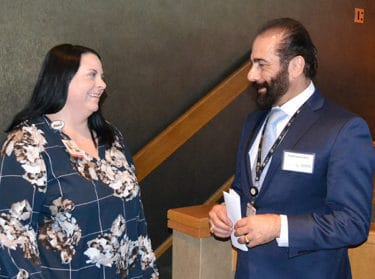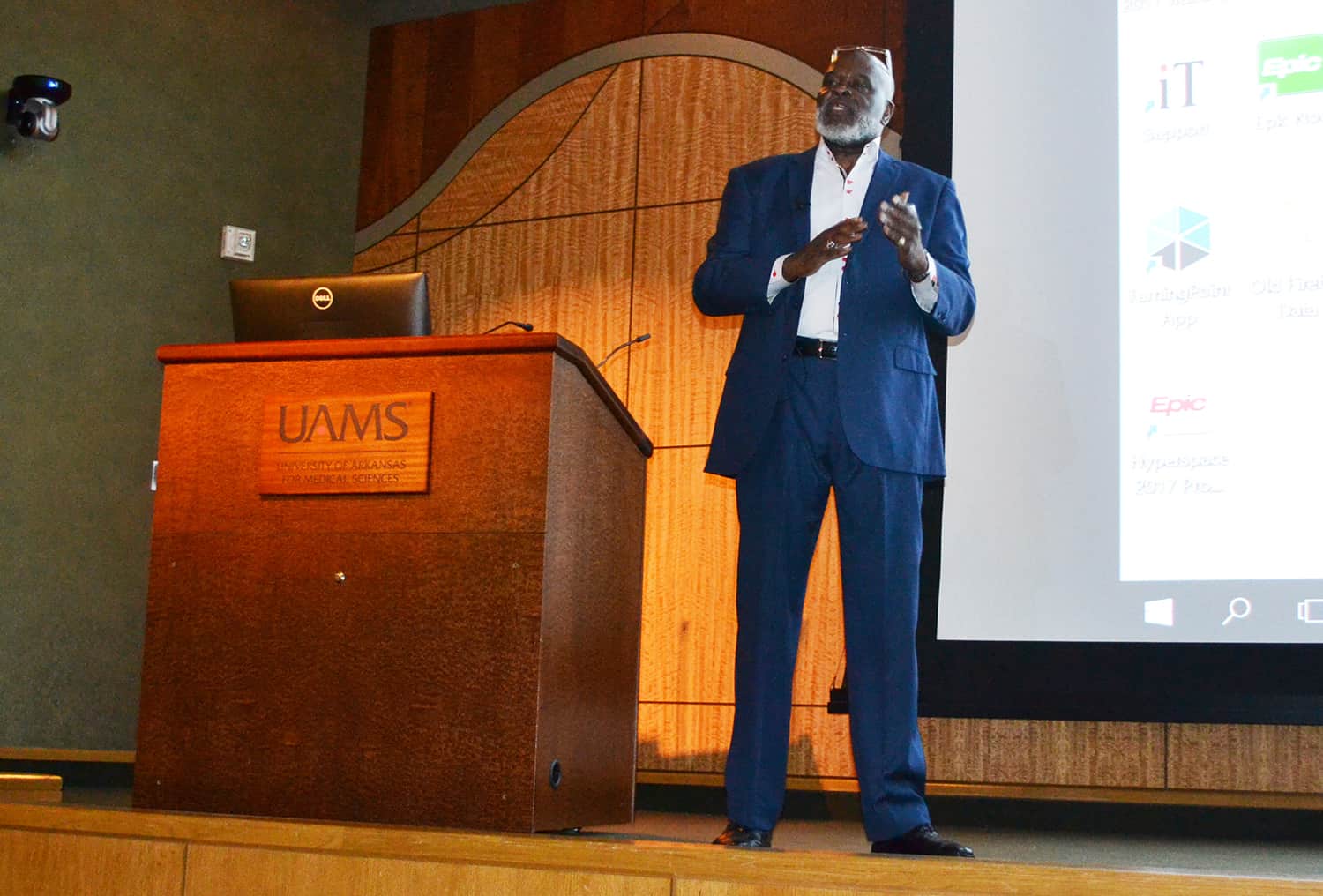Symposium Spotlights Psychology of Sickle Cell Disease
| By 2014, Shamonica Wiggins had reached a point where she couldn’t cope with her sickle cell disease. She felt lost and defeated until a therapist helped her try a new approach.
Wiggins, 25 and a Dallas native, spoke Sept. 18 at the Sickle Cell Symposium at UAMS. She was one of two guest speakers at the gathering sponsored by the UAMS Adult Sickle Cell Clinical Program.

Shamonica Wiggins discussed her experience with sickle cell disease and how psychological therapy helped her to cope better with it.
“Depression, too many meds, and I was in a bad place,” Wiggins said. “I was always in the hospital. Eventually, I gave in and went to see the therapist. Once I did, I wondered why I had kept putting it off. It was a big help. She helped me look at things from a different perspective and weigh out things properly.”
Wiggins was spending a week of each month in the hospital. She was always in pain and always hurting. The hematologist who regularly treated her told Wiggins she was so overloaded with pain medications that they actually were hurting more than helping her. Wiggins’ physician convinced her that depression was a part of her problem.
Wiggins said as much as she could, she would hide her pain from her mother and family. That lack of communication along with mishandling stress in her life was causing more pain episodes and increasing their duration.
Regular therapy started to change her health for the better. Through better personal planning and time management, meditation, exercise and even hot baths, the frequency and lengths of hospital stays diminished. With her physicians, Wiggins put a care plan in place to help make sure she spent the minimum time necessary in the hospital, too.
“You’re going to have bad days, and you need to manage your mental health just as carefully as you manage your physical health,” she said. “It has really helped me in my journey as a patient. I learned a lot from my psychologist, especially the importance of telling the people around you how you’re feeling. Otherwise, you’re not going to move forward.”
Wiggins has since founded #BoldLipsForSickleCell to educate and raise awareness of sickle cell disease through its advocates wearing bold lipstick colors.
“By doing this, they are making a loud and boisterous statement, which in turn gains attention along with conversations being sparked,” the group’s mission statement said.
Bold Lips also organizes public events to raise awareness and educate the public about sickle cell disease.
A superstitious belief that diseases like sickle cell and others are somehow a divine judgment on a person or people for moral failings persists even today, said the Rev. Johnny Smith, who was the pastoral speaker at the symposium.
“We need you to help us to eliminate that stigma,” Smith said. “Individuals aren’t always responsible for their circumstances. If we can eliminate that belief, then they can see the church as something that can help them.”

Issam Makhoul, M.D., right, visits with Leigh Ann Wilson before he addresses the audience at the Sickle Cell Symposium. Makhoul is director of the UAMS Adult Sickle Cell Clinical Program.
Clergy and congregants can give counsel and just as importantly direct people who are physically or mentally ill to health care providers and therapists with clinical expertise.
People of faith who want to help need to engage those who are suffering but keep in mind their own limitations. Prayer and scripture alone may not be enough.
“Doctors are God’s instruments to minister to our well-being,” Smith said. “If you pray to God to heal you, you can’t dictate to him how to heal you.”
Leigh Ann Wilson, a licensed clinical social worker, also discussed local resources that can help patients cope with sickle cell disease. Wilson has worked in the UAMS Adult Sickle Cell Clinical Program for four years.
At the start of the symposium, Issam Makhoul, M.D., the program’s director, addressed the audience, too.
“As we go into our fifth year, I can say this program is growing and fulfilling its commitment and meaning serving the adult sickle cell population in Arkansas with a dedication to excellence and being a hub for health care providers,” Makhoul said.
